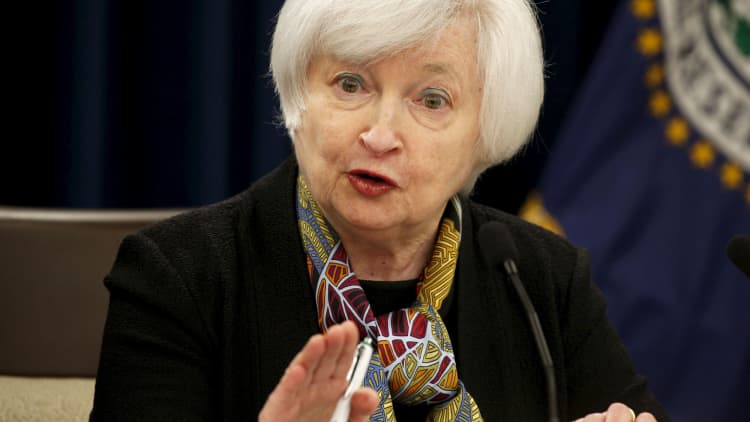
The U.S. economy is closing in on the Federal Reserve's goals, giving the central bank impetus to start reducing the extreme levels of support it has provided over the past decade, Chair Janet Yellen said in a speech Wednesday.
After more than a decade of benefiting from historically aggressive easing measures, the economy is "close" to the Fed's objectives, though policy removal is expected to be slow, Yellen said in San Francisco. The speech, to the Commonwealth Club, essentially served as a monetary policy primer, though she did drop some hints about the road ahead.
The Fed last hiked its key overnight lending rate in December, just the second such move since 2006. While doing so, Federal Open Market Committee officials indicated that three more hikes could happen this year, though the timing will depend on economic data.
"As the economy approaches our objectives, it makes sense to gradually reduce the level of monetary policy support," Yellen said, according to prepared remarks.
She said the long-run unemployment rate is probably 4.75 percent, just above the current 4.7 percent. Inflation is "inching back" toward the Fed's 2 percent goal, which has remained elusive even as the economy has stayed out of recession for nearly eight years and unemployment is at its lowest level since late 2007.
Despite the economic improvements, the Fed has remained cautious.
"Right now our foot is still pressing on the gas pedal, though, as I noted, we have eased back a bit," Yellen said.
"Our foot remains on the pedal in part because we want to make sure the economic expansion remains strong enough to withstand an unexpected shock, given that we don't have much room to cut interest rates," she added.
Indeed, even with the hikes of the past two Decembers the funds rate remains in a target range of 0.5 to 0.75 percent, with the actual rate most recently at 0.66 percent. While Fed officials have indicated a more aggressive rate-hiking schedule, traders believe there will be at most two moves this year — one in June and another in November or December. Futures contracts imply a funds rate of 1.07 percent by the end of the year.
Critics worry that the FOMC will fall behind the curve should growth accelerate and force interest rate increases at a faster pace than markets anticipate. However, Yellen said low productivity levels likely will keep inflation from getting out of control.
The funds rate, which banks charge to lend to each other overnight, likely will be at 3 percent by the end of 2019, a target that Yellen acknowledged is "a full percentage point lower than our estimate just three years ago."
With the current path, Yellen said interest rates on items such as mortgages and credit cards likely will "creep" up, though "they probably will not increase dramatically."
"Figuring out what the neutral interest rate is and setting the right path toward it is not like setting the thermostat in a house: You can't just set the temperature at 68 degrees and walk away," she said.


